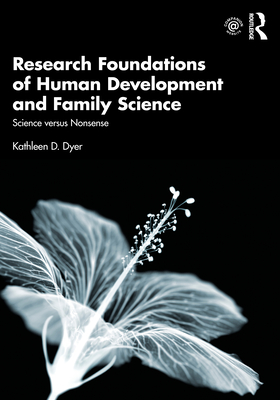Research Foundations of Human Development and Family Science: Science versus Nonsense

Research Foundations of Human Development and Family Science: Science versus Nonsense
Human Development and Family Science (HDFS) is an interdisciplinary and applied field that draws from developmental science, family science, and other social sciences. Research Foundations of Human Development and Family Science is a textbook that provides an introduction to the diverse scientific research methods that form the foundation of scholarship and practice in HDFS.
In Part I, Kathleen D. Dyer explores science. She distinguishes empirical scientific research from common sense and from knowledge gained from personal experience. This section also includes a discussion of the strategies used by pseudoscience to exploit the well-deserved credibility of science, providing relevant examples. Part II examines systematic empiricism through sampling and measurement. HDFS scholars use a wide array of measurement tools, including self-report (interviews, questionnaires, and self-report tasks), observations (participant, naturalistic, and structured), objective tests, physiological measures, and several types of archival records. Part III introduces the use of study design to achieve falsifiability in scientific research, including an overview of various orientations to time used in research as well as four different study designs: qualitative, prevalence, correlational, and experimental. Finally, Part IV addresses the public verifiability of science, including how scientific consensus is developed, the use of literature reviews to identify convergence of evidence, and how scientific literacy translates into evidence-based professional practice.
Illustrated throughout with studies foundational to the discipline as examples of the strategies described in the text, Research Foundations for Human Development and Family Science is a comprehensive, accessible core textbook for undergraduate research methods classes in HDFS. It introduces the discipline of HDFS and challenges students to understand the limitations of common sense and the threat of pseudoscience for those work professionally with children and families.
PRP: 697.03 Lei
Acesta este Pretul Recomandat de Producator. Pretul de vanzare al produsului este afisat mai jos.
627.33Lei
627.33Lei
697.03 LeiLivrare in 2-4 saptamani
Descrierea produsului
Human Development and Family Science (HDFS) is an interdisciplinary and applied field that draws from developmental science, family science, and other social sciences. Research Foundations of Human Development and Family Science is a textbook that provides an introduction to the diverse scientific research methods that form the foundation of scholarship and practice in HDFS.
In Part I, Kathleen D. Dyer explores science. She distinguishes empirical scientific research from common sense and from knowledge gained from personal experience. This section also includes a discussion of the strategies used by pseudoscience to exploit the well-deserved credibility of science, providing relevant examples. Part II examines systematic empiricism through sampling and measurement. HDFS scholars use a wide array of measurement tools, including self-report (interviews, questionnaires, and self-report tasks), observations (participant, naturalistic, and structured), objective tests, physiological measures, and several types of archival records. Part III introduces the use of study design to achieve falsifiability in scientific research, including an overview of various orientations to time used in research as well as four different study designs: qualitative, prevalence, correlational, and experimental. Finally, Part IV addresses the public verifiability of science, including how scientific consensus is developed, the use of literature reviews to identify convergence of evidence, and how scientific literacy translates into evidence-based professional practice.
Illustrated throughout with studies foundational to the discipline as examples of the strategies described in the text, Research Foundations for Human Development and Family Science is a comprehensive, accessible core textbook for undergraduate research methods classes in HDFS. It introduces the discipline of HDFS and challenges students to understand the limitations of common sense and the threat of pseudoscience for those work professionally with children and families.
Detaliile produsului








